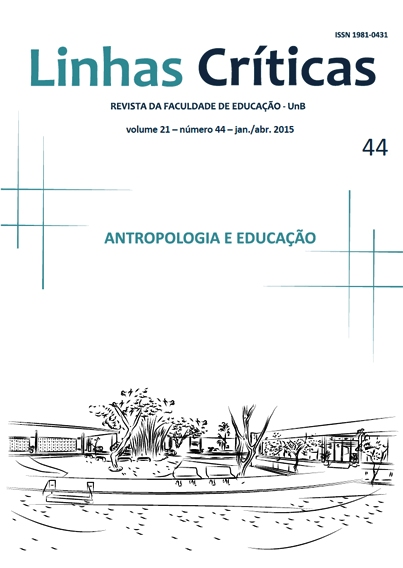Anthropology and education: one field and many paths
DOI:
https://doi.org/10.26512/lc.v21i44.4463Keywords:
Anthropology of Education, Ethnography, Education and Diversity, HistoryAbstract
This paper discusses the interaction between different things that are neither equal nor similar in nature. That is the case when we think of possible relations among two fields of knowledge: Anthropology and Education. Fields that differ in their principles and in their central assumptions, whose movement of intercommunication and exchange presupposes constant criticism as well as a continuing review of one’s own steps. For this reason, talking about dialogue between diverse fields of knowledge is also talking about potential conflicts and risks. It is speaking of a tensional context that challenges anthropological work, its practice and theoretical support, when it moves in a border region between one and another field of knowledge. The goal is to think about the possibilities of a comprehensive and critical Anthropology of Education, under construction in Brazil today.
Downloads
References
FONSECA, Claudia. Quando cada caso NÃO é um caso. Revista Brasileira de Educação. n. 10. jan/fev/abr. 1999 pp. 58-78.
GUSMÃO, Neusa Maria Mendes de. Antropologia e educação: origens de um diálogo. IN: GUSMÃO, Neusa Maria Mendes de. Antropologia e educação. Interfaces do ensino e da pesquisa. Cadernos CEDES, n. 43, Campinas: Centro de Estudos Educação e Sociedade/UNICAMP, 1997 pp. 8-25.
GUSMÃO, Neusa Maria Mendes de. (Org.) Diversidade, cultura e educação: olhares cruzados. São Paulo: Biruta, 2003.
GUSMÃO, Neusa Maria Mendes de. Por uma antropologia da educação no Brasil. Pro-Posições. Revista da Faculdade de Educação/UNICAMP, v. 21, n. 2 (62) ”“ maio/ago. 2010. pp. 259-265.
GUSMÃO, Neusa Maria Mendes de. Aportes finais de um debate em aberto. In: TOSTA, Sandra P; ROCHA, Gilmar. Diálogos sem fronteira. Historiografia, etnografia e educação em culturas ibero-americanas. Belo Horizonte: Editora Autêntica, 2014. No prelo.
KUPER, Adam. Cultura. A visão dos antropólogos. Bauru, SP: EDUSC, 2002.
LAPLANTINE, François. Aprender antropologia. São Paulo: Brasiliense, 2007. 20ª reimpr. (1ª ed. de 1988).
LOVISOLO, Hugo. Antropologia e educação na sociedade complexa. Revista Brasileira de Estudos Pedagógicos. n. 65, jan./abr. de 1984, pp. 56-69.
SANTAMARIA, Enrique. Do conhecimento de próprios e estranhos (disquisições sociológicas). In: LARROSA, Jorge; LARA, Nuria Pérez de. (orgs.) Imagens do outro. Petrópolis :Vozes, 1998. pp. 47-66.
OLIVEIRA, Amurabi. Antropologia e/da educação no Brasil: entrevista com Neusa Gusmão. Cadernos de Campo. nº 22, jan./dez.(2013). pp. 147-160. Disponível em: <http://www.revistas.usp.br/cadernosdecampo/article/view/56167>. Acesso em: 10/05/2014
OLIVEIRA, Roberto Cardoso de. Ao trabalho do antropólogo: olhar, ouvir, escrever. In: OLIVEIRA, Roberto Cardoso de. O trabalho do antropólogo. Brasília: Paralelo 15; S Paulo: Ed. UNESP, 1998. pp. 17-35.
PEIRANO, Marisa. Os antropólogos e suas linhagens. Revista Brasileira de Ciências Sociais. n.16, ano 6, jul. de 1991 pp. 43-50.
SANCHIS, Pierre. Uma leitura dos textos da mesa redonda sobre ensino de ciências sociais em questão: a Antropologia. In: GROSSI, Mirian P.; TASSINARI, Antonella; RIAL, Carmen (Orgs.). Ensino de antropologia no Brasil: formação, práticas disciplinares e além fronteiras. Blumenau: Nova Letra, 2006. pp. 111-125.
TOSTA, Sandra P.; ROCHA, Gilmar. Antropologia & educação. Belo Horizonte: Autêntica, 2009.
VALENTE, Ana Lucia E. Farah. Usos e abusos da Antropologia na pesquisa educacional Pro-Posições.”“ Revista da Faculdade de Educação/UNICAMP, v. 7, n.2, jul. de 1996. pp.54-64.
VALENTE, Ana Lucia E. Farah, Por uma antropologia de alcance universal. Cadernos Cedes 43. Campinas:Centro de Estudos Educação e Sociedade ”“ Cedes, 1997. pp. 58-74.
VIEIRA, Ricardo. Mentalidades, escola e pedagogia intercultural. Educação, Sociedade & Culturas, n.4, 1995.
VIEIRA, Ricardo. Histórias de vida e identidades. Professores e interculturalidade. Porto: Afrontamento, 1999.
Downloads
Published
How to Cite
Issue
Section
License
Copyright (c) 2016 Linhas Críticas

This work is licensed under a Creative Commons Attribution 4.0 International License.
Authors who publish in this journal agree to the following terms:
-Authors maintains the copyright and grants the journal the right of first publication, the work being simultaneously licensed under the Creative Commons Attribution License which allows the sharing of the work with recognition of the authorship of the work and initial publication in this journal.
- Authors are authorized to enter into additional contracts separately, for non-exclusive distribution of the version of the work published in this journal (eg publish in institutional repository or as a book chapter), with acknowledgment of authorship and initial publication in this journal.
-Authorers are allowed and encouraged to publish and distribute their work online (eg in institutional repositories or on their personal page) at any point before or during the editorial process, as this can generate productive changes as well as increase the impact and the citation of published work (See The Effect of Free Access).



